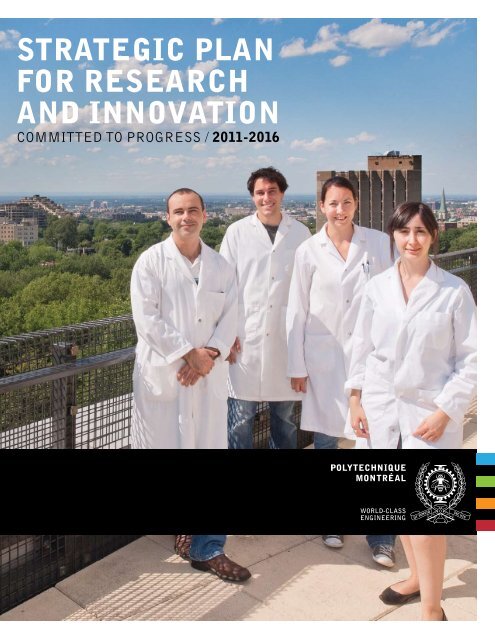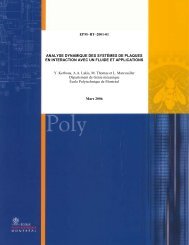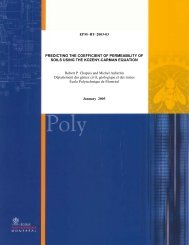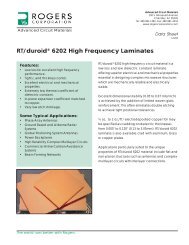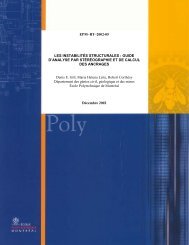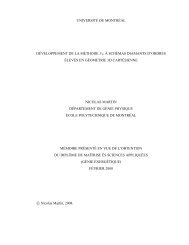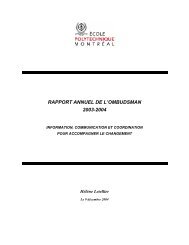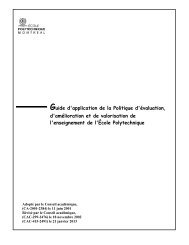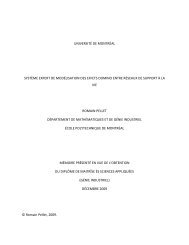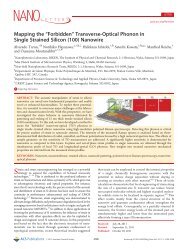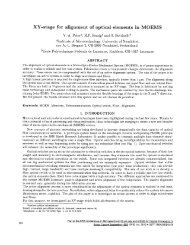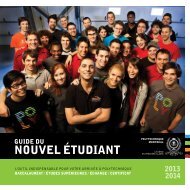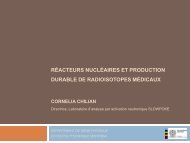strategic plan for research and innovation - École Polytechnique de ...
strategic plan for research and innovation - École Polytechnique de ...
strategic plan for research and innovation - École Polytechnique de ...
Create successful ePaper yourself
Turn your PDF publications into a flip-book with our unique Google optimized e-Paper software.
STRATEGIC PLAN<br />
FOR RESEARCH<br />
AND INNOVATION<br />
Committed to Progress / 2011-2016
In<strong>de</strong>x<br />
Contributions............................................ 4<br />
Introduction .. . . . . . . . . . . . . . . . . . . . . . . . . . . . . . . . . . . . . . . . . . . . 5<br />
Mission <strong>and</strong> vision .. . . . . . . . . . . . . . . . . . . . . . . . . . . . . . . . . . . . . . . 6<br />
Context <strong>and</strong> challenges .................................... 7<br />
Action strategies . . . . . . . . . . . . . . . . . . . . . . . . . . . . . . . . . . . . . . . . . . 7<br />
Strategic direction 1....................................... 8<br />
Strategic direction 2....................................... 9<br />
Strategic direction 3...................................... 10<br />
Strategic direction 4.......................................11<br />
Strategic direction 5...................................... 12<br />
<strong>Polytechnique</strong>’s spheres of excellence......................... 13
4 Strategic Plan <strong>for</strong> Research <strong>and</strong> Innovation 2011-2016<br />
Contributions<br />
Members of the Strategic Planning Task Force<br />
Co-ordination:<br />
Gilles Savard<br />
/ Dean, Research <strong>and</strong> Innovation<br />
Patrick Desjardins<br />
/ Professor, Department of Engineering Physics<br />
Carl-Éric Aubin<br />
/ Professor, Department of Mechanical Engineering<br />
Catherine Beaudry<br />
/ Professor, Department of Mathematics <strong>and</strong> Industrial Engineering<br />
Caroline Boudoux<br />
/ Professor, Department of Engineering Physics<br />
Augustin Brais<br />
/ Director, Office of Research <strong>and</strong> Centre <strong>for</strong> Technological Development<br />
Robert Corthésy<br />
/ Professor, Department of Civil, Geological <strong>and</strong> Mining Engineering<br />
Basil Favis<br />
/ Professor, Department of Chemical Engineering<br />
Clément Fortin<br />
/ Director, Department of Mechanical Engineering<br />
Nicolas Godbout<br />
/ Professor, Department of Engineering Physics<br />
Jean-Jacques Laurin<br />
/ Professor, Department of Electrical Engineering<br />
Dominique Orban<br />
/ Professor, Department of Mathematics <strong>and</strong> Industrial Engineering<br />
Samuel Pierre<br />
/ Professor, Department of Computer Engineering<br />
Céline Roehrig<br />
/ Advisor to the Dean, Research <strong>and</strong> Innovation<br />
Réjean Samson<br />
/ Professor, Department of Chemical Engineering<br />
François Soumis<br />
/ Professor, Department of Mathematics <strong>and</strong> Industrial Engineering<br />
Jean-Yves Trépanier<br />
/ Professor, Department of Mechanical Engineering
5<br />
Introduction<br />
/ Gilles Savard, PhD, Dean of Research <strong>and</strong> Innovation<br />
Committed to Progress presents the <strong>strategic</strong> directions chosen by the<br />
<strong>Polytechnique</strong> community in or<strong>de</strong>r to face a newly globalized <strong>and</strong> highly<br />
competitive <strong>research</strong> environment in which universities are expected to<br />
have a growing impact on society. This <strong>plan</strong> is not a fast, opportunistic<br />
response to recent paradigm shifts. Quite the opposite; it is born of an in<strong>de</strong>pth<br />
<strong>de</strong>liberation on the part of our community. This reflection is solidly<br />
built upon <strong>Polytechnique</strong>’s mission, vision statement <strong>and</strong> values, <strong>and</strong> the<br />
element of training holds a central place in it. Supported by the Task Force<br />
<strong>for</strong> the Strategic Planning of Research <strong>and</strong> Innovation, this <strong>plan</strong> is the<br />
outcome of a process that we have sought to make open, inclusive <strong>and</strong><br />
transparent. It has been validated on an ongoing basis by <strong>Polytechnique</strong>'s<br />
main authorities <strong>and</strong> by our partners, particularly the Comité consultatif<br />
<strong>de</strong> l’<strong>École</strong> <strong>Polytechnique</strong> (<strong>Polytechnique</strong> Montréal advisory committee—<br />
COCEP). This ambitious project meets the st<strong>and</strong>ard of excellence<br />
maintained by our faculty, our stu<strong>de</strong>nts <strong>and</strong> our staff.<br />
Committed to Progress will gui<strong>de</strong> <strong>Polytechnique</strong>’s actions at a time of<br />
increasing globalization, during which governments, funding agencies<br />
<strong>and</strong> public authorities are making <strong>research</strong> <strong>and</strong> <strong>innovation</strong> a core element<br />
of their initiatives to support economic growth. As a <strong>de</strong>signated player<br />
in this growth, <strong>Polytechnique</strong> must now <strong>de</strong>monstrate its contributions<br />
to society. It must become even more involved in key areas of local <strong>and</strong><br />
national competition <strong>and</strong> commit to consolidating the valorization of<br />
<strong>research</strong> results. <strong>Polytechnique</strong> must also be a mo<strong>de</strong>l of responsibility <strong>and</strong><br />
ethics. It is not sufficient to simply meet these requirements—we must be<br />
at the <strong>for</strong>efront; we must be a lea<strong>de</strong>r.<br />
Committed to Progress <strong>de</strong>monstrates that <strong>Polytechnique</strong> is resolutely<br />
<strong>de</strong>termined to remain among the leading engineering faculties in<br />
Canada <strong>and</strong> that it wishes to continue to increase the magnitu<strong>de</strong> of its<br />
positive impact on society. This impact can be measured using several<br />
criteria: the quality of the <strong>research</strong>ers <strong>and</strong> innovators we train, the<br />
importance of our innovative <strong>and</strong> breakthrough <strong>research</strong> projects, <strong>and</strong><br />
the establishment of visionary <strong>strategic</strong> partnerships. This impact can<br />
also be measured by our openness to society’s needs, which translates<br />
into our community’s responsible social commitment.<br />
The general <strong>strategic</strong> objective of our 2011–2016 <strong>plan</strong> revolves<br />
around these five themes: Training, Research, Partnership, Social<br />
Commitment <strong>and</strong> Responsibility. This objective is:<br />
To have a measurable impact on 21st-century society by means<br />
of training highly qualified personnel <strong>and</strong> by conducting,<br />
disseminating <strong>and</strong> valorizing innovative <strong>research</strong> <strong>and</strong><br />
<strong>de</strong>velopment work.<br />
Today, this <strong>plan</strong> enables the establishment of a framework of reference<br />
to gui<strong>de</strong> <strong>Polytechnique</strong>’s actions, in particular those of the Research<br />
<strong>and</strong> Innovation Directorate, in or<strong>de</strong>r to support <strong>Polytechnique</strong>’s<br />
<strong>research</strong> mission <strong>and</strong> to face today’s challenges. It also highlights<br />
the importance of the well-structured organization of our spheres<br />
of excellence in <strong>research</strong>, <strong>and</strong> of differentiating our approaches<br />
<strong>de</strong>pending on the type of <strong>research</strong> in question, whether sector-based<br />
or supportive.<br />
I wish to sincerely thank all the people who contributed to <strong>de</strong>veloping<br />
this <strong>plan</strong>. Your rigour <strong>and</strong> your investment in the values of our<br />
institution are greatly appreciated.<br />
Thank you <strong>for</strong> your commitment!
6 Strategic Plan <strong>for</strong> Research <strong>and</strong> Innovation 2011-2016<br />
Mission<br />
<strong>and</strong> Vision<br />
The mission<br />
As an institution of higher learning, <strong>Polytechnique</strong> Montréal’s mission is<br />
to:<br />
• provi<strong>de</strong> high-quality engineering training at every level, with a focus on<br />
human values;<br />
• carry out relevant, high-level <strong>research</strong> as the basis <strong>for</strong> high-quality<br />
training at the master’s <strong>and</strong> doctorate levels that takes into consi<strong>de</strong>ration<br />
the needs of industry <strong>and</strong> society;<br />
• wield intellectual <strong>and</strong> social influence, concretely achieved through<br />
interactions with external communities both at home <strong>and</strong> abroad.<br />
The flagship of engineering in Québec, <strong>Polytechnique</strong> Montréal is also one<br />
of the largest engineering training <strong>and</strong> <strong>research</strong> institutions in Canada.<br />
True to its mission <strong>for</strong> over 135 years, <strong>Polytechnique</strong> has trained more than<br />
38,000 engineers, <strong>de</strong>velopers <strong>and</strong> <strong>research</strong>ers. <strong>Polytechnique</strong> contributes<br />
to major discoveries <strong>and</strong> technologies in every sphere of engineering, <strong>and</strong><br />
its accomplishments are disseminated <strong>and</strong> admired across the world.<br />
<strong>Polytechnique</strong> is a key player in the area of engineering <strong>and</strong> <strong>innovation</strong>,<br />
<strong>and</strong> a sought-after partner <strong>for</strong> many innovative businesses, both in Québec<br />
<strong>and</strong> elsewhere in Canada, as well as in the rest of the world. Since its<br />
founding, <strong>Polytechnique</strong> has been an institution resolutely engaged in its<br />
community.<br />
The vision<br />
<strong>Polytechnique</strong> is a university institution that trains world-class engineers<br />
<strong>and</strong> <strong>research</strong>ers, <strong>and</strong> is internationally renowned in that capacity; it is<br />
solidly rooted in its field, where it is recognized <strong>for</strong> the quality <strong>and</strong> ad<strong>de</strong>d<br />
value of its training at all levels of higher education, as well as <strong>for</strong> its<br />
active role in technological, economic <strong>and</strong> social <strong>de</strong>velopment. It relies<br />
on:<br />
• its ability to innovate at every level of teaching <strong>and</strong> <strong>research</strong>;<br />
• the intensity of its partnerships with industry;<br />
• the efficiency of its management processes.<br />
<strong>Polytechnique</strong> <strong>de</strong>fines itself as a lea<strong>de</strong>r—an institution that, in addition<br />
to excelling in all its activities, contributes to trans<strong>for</strong>ming approaches in<br />
the field. <strong>Polytechnique</strong> is a lea<strong>de</strong>r that, through its graduates, <strong>research</strong><br />
projects <strong>and</strong> partnerships, has a tangible <strong>and</strong> lasting positive impact on<br />
its milieu.<br />
The flagship of engineering in Québec, <strong>Polytechnique</strong> Montréal<br />
is also one of the largest engineering training<br />
<strong>and</strong> <strong>research</strong> establishments in Canada.
7<br />
Context <strong>and</strong><br />
challenges<br />
The environment <strong>for</strong> training highly qualified employees <strong>and</strong> <strong>research</strong><br />
is constantly changing in Québec <strong>and</strong> Canada. And with good reason:<br />
businesses are facing unprece<strong>de</strong>nted work<strong>for</strong>ce challenges, seeking<br />
to recruit employees who are highly competent in both the scientific<br />
<strong>and</strong> technical fields, but also as agents of progress <strong>and</strong> as lea<strong>de</strong>rs who<br />
can integrate into a milieu that is rapidly changing. Consequently,<br />
<strong>Polytechnique</strong> is <strong>de</strong>termined to maintain <strong>and</strong> strengthen its training of the<br />
highly qualified work<strong>for</strong>ce that society needs.<br />
The Stratégie québécoise <strong>de</strong> la recherche et <strong>de</strong> l’<strong>innovation</strong> (Québec<br />
Research <strong>and</strong> Innovation Strategy—QRIS) has now explicitly placed<br />
<strong>research</strong> <strong>and</strong> <strong>innovation</strong> at the core of a province-wi<strong>de</strong> system of<br />
<strong>innovation</strong>. Governments are asking universities to play an increased role<br />
in key areas of competition, to get involved in society, to consolidate the<br />
valorization of <strong>research</strong> results <strong>and</strong> to establish major partnerships.<br />
In the same vein, government practices in regard to <strong>research</strong> funding have<br />
markedly evolved over the course of the last 10 years. While programs that<br />
encourage the pursuit of free <strong>and</strong> fundamental <strong>research</strong> still exist, their<br />
financing is stagnating <strong>de</strong>spite the increased number of professors active<br />
in <strong>research</strong> in Québec. At the same time, we are seeing a proliferation of<br />
programs aiming to strengthen priority areas that pertain to <strong>innovation</strong><br />
<strong>and</strong> technology-transfer challenges. In this regard, institutions are being<br />
asked to contribute financially to mounting major projects which they<br />
must then prioritize based on their institutional <strong>research</strong> <strong>plan</strong>.<br />
Lastly, universities are rightfully being expected to set an example in terms<br />
of sustainable <strong>de</strong>velopment, social involvement, ethics <strong>and</strong> governance.<br />
<strong>Polytechnique</strong> wants to reaffirm its intention to remain a mo<strong>de</strong>l of good<br />
governance <strong>and</strong> responsibility.<br />
Action<br />
strategies<br />
Committed to Progress is the overarching theme of our <strong>strategic</strong> <strong>plan</strong>. <strong>Polytechnique</strong> aims to have a measurable impact on 21st-century society by<br />
means of training highly qualified people <strong>and</strong> by conducting, disseminating <strong>and</strong> valorizing innovative <strong>research</strong> <strong>and</strong> <strong>de</strong>velopment work.<br />
<strong>Polytechnique</strong> is focusing on five complementary <strong>strategic</strong> directions in or<strong>de</strong>r to maximize the impact of its actions:<br />
1. Training <strong>research</strong>ers <strong>and</strong> innovators, agents of progress at the global level, who are capable of transferring their knowledge to society.<br />
2. Conducting innovative <strong>research</strong> that has a major impact on 21st-century society.<br />
3. Building visionary <strong>strategic</strong> partnerships.<br />
4. Strengthening <strong>Polytechnique</strong>’s commitment to, <strong>and</strong> lea<strong>de</strong>rship within, its communities, both geographic <strong>and</strong> intellectual.<br />
5. Acting responsibly <strong>and</strong> ethically.
8 Strategic Plan <strong>for</strong> Research <strong>and</strong> Innovation 2011-2016<br />
STRATEGIC<br />
DIRECTION 1<br />
Training <strong>research</strong>ers <strong>and</strong> innovators,<br />
agents of progress at the global level,<br />
who are capable of transferring their<br />
knowledge to society.<br />
<strong>Polytechnique</strong> is recognized <strong>for</strong> the quality of its graduates’ training.<br />
There<strong>for</strong>e, it is not surprising that many of them hold <strong>strategic</strong> positions<br />
in Québec, Canada <strong>and</strong> elsewhere in the world. In a society that is relying<br />
on a more creative <strong>and</strong> entrepreneurial population, <strong>Polytechnique</strong> must<br />
continue to innovate in its training <strong>and</strong> commit to educating <strong>research</strong>ers<br />
<strong>and</strong> innovators to be agents of progress at the global level, who are capable<br />
of transferring their knowledge to society. Essentially, <strong>Polytechnique</strong> aims<br />
to train the highly qualified work<strong>for</strong>ce that society needs, particularly in<br />
Québec. We are talking about a work<strong>for</strong>ce that is not only competent<br />
in scientific <strong>and</strong> technical terms, but is also able to quickly affirm its<br />
lea<strong>de</strong>rship, read its environment, i<strong>de</strong>ntify favourable opportunities,<br />
mobilize resources <strong>and</strong> find innovative solutions.<br />
In addition to training tomorrow’s <strong>research</strong>ers, <strong>Polytechnique</strong> wants to<br />
directly contribute to increasing industrial R&D in Québec by educating<br />
workers who can grasp local <strong>and</strong> global issues <strong>and</strong> contribute original<br />
solutions. <strong>Polytechnique</strong> also wants to affirm its status as an international<br />
university, attracting high-calibre stu<strong>de</strong>nts from all over the world.<br />
Our objectives <strong>for</strong> 2011-2016<br />
■ Offer programs <strong>and</strong> an educational environment that are<br />
attractive <strong>and</strong> adapted to stakehol<strong>de</strong>rs’ needs, expectations <strong>and</strong><br />
ambitions.<br />
■ Recruit high-calibre stu<strong>de</strong>nts <strong>and</strong> postdoctoral interns.<br />
■ Introduce stu<strong>de</strong>nts to <strong>research</strong> <strong>and</strong> <strong>innovation</strong> starting at the<br />
un<strong>de</strong>rgraduate level.<br />
Criteria <strong>for</strong> measuring our success<br />
■ Quality of graduate stu<strong>de</strong>nts’ education, as recognized by our<br />
partners.<br />
■ Ability to follow the professional <strong>de</strong>velopment of our graduates.<br />
■ Quality, number <strong>and</strong> diversity of graduate stu<strong>de</strong>nts <strong>and</strong><br />
postdoctoral interns.<br />
■ Level <strong>and</strong> diversity of funding sources <strong>for</strong> doctoral stu<strong>de</strong>nts.<br />
■ Number of un<strong>de</strong>rgraduate stu<strong>de</strong>nts involved in <strong>research</strong><br />
activities.
9<br />
STRATEGIC<br />
DIRECTION 2<br />
Conducting innovative <strong>research</strong> that<br />
has a major impact on 21st-century<br />
society.<br />
<strong>Polytechnique</strong> is a lea<strong>de</strong>r in Canadian <strong>research</strong>. Our <strong>research</strong>ers hold a<br />
very high level of funding, supervise an impressive number of stu<strong>de</strong>nts <strong>and</strong><br />
publish in the best journals. <strong>Polytechnique</strong> professors also play key roles<br />
in the major <strong>research</strong> networks in Québec, in Canada <strong>and</strong> worldwi<strong>de</strong>. Our<br />
ambition is to be an institution recognized <strong>for</strong> its innovative <strong>research</strong> <strong>and</strong><br />
<strong>for</strong> its impact on society. Our spheres of excellence must be recognized<br />
internationally <strong>for</strong> the quality of their <strong>research</strong> <strong>and</strong> <strong>de</strong>velopment work.<br />
At a time of the internationalization of <strong>research</strong>, <strong>Polytechnique</strong> must<br />
collaborate with the best <strong>for</strong>eign <strong>research</strong>ers. We must also encourage<br />
<strong>and</strong> support interdisciplinary <strong>and</strong> high-risk <strong>research</strong> in promising fields,<br />
as well as recognizing that a diversified <strong>and</strong> high-level <strong>research</strong> base is<br />
essential <strong>for</strong> nourishing the <strong>de</strong>velopment of new knowledge.<br />
Our objectives <strong>for</strong> 2011-2016<br />
■ Develop a high-calibre faculty <strong>and</strong> support its <strong>research</strong><br />
excellence.<br />
■ Ensure excellence in basic <strong>research</strong>, encourage interdisciplinary<br />
<strong>research</strong> in or<strong>de</strong>r to stimulate <strong>research</strong> that leads to<br />
breakthrough technologies, <strong>and</strong> cultivate an <strong>innovation</strong> mindset.<br />
■ Strengthen <strong>and</strong> support the spheres of excellence in leadingedge<br />
fields.<br />
■ Maintain <strong>and</strong> improve <strong>Polytechnique</strong>’s <strong>research</strong> infrastructure.<br />
Criteria <strong>for</strong> measuring our success<br />
■ Comparative per<strong>for</strong>mance analysis of <strong>research</strong> based on<br />
key indicators: grants, chairs, partnerships, impact factor.<br />
Objective: 95 percentiles in Canada.<br />
■ Impact indicators shared <strong>and</strong> accepted by our partners.<br />
■ Proportion of professors whose <strong>research</strong> is fun<strong>de</strong>d. Objective:<br />
95%.<br />
■ Level of start-up funding <strong>for</strong> professors’ <strong>research</strong> activities.<br />
■ Number of newly fun<strong>de</strong>d interdisciplinary studies.<br />
■ Quality of mechanisms <strong>and</strong> functional structures making it<br />
possible to evaluate, monitor, provi<strong>de</strong> lea<strong>de</strong>rship <strong>for</strong> <strong>and</strong> <strong>de</strong>velop<br />
the spheres of excellence.<br />
■ Quality of <strong>research</strong> infrastructures.
10 Strategic Plan <strong>for</strong> Research <strong>and</strong> Innovation 2011-2016<br />
STRATEGIC<br />
DIRECTION 3<br />
Building visionary <strong>strategic</strong><br />
partnerships.<br />
As far back as more than 40 years ago, <strong>Polytechnique</strong> was innovating by<br />
embarking on <strong>research</strong> projects in partnership with industry. This practice,<br />
which in the past was the private preserve of a few especially avant-gar<strong>de</strong><br />
institutions, is now part of the <strong>research</strong> portfolio of nearly all Canadian<br />
universities. In fact, the main Canadian <strong>and</strong> Québec granting agencies<br />
now place particular emphasis on such partnership projects.<br />
In an increasingly global context, we are now seeing the creation of<br />
<strong>research</strong> consortiums, multi-university partnerships <strong>and</strong> multi-sector<br />
collaborations. There is no <strong>de</strong>nying that <strong>Polytechnique</strong> remains a small<br />
institution, <strong>and</strong> it cannot hope to compete with organizations or groups<br />
that are 10 or even 20 times its size. <strong>Polytechnique</strong> also recognizes the<br />
importance of increasingly anchoring its major sector-based spheres of<br />
excellence in industry.<br />
Our challenge <strong>for</strong> the next few years will be to establish <strong>strategic</strong><br />
partnerships that will increase the impact, at all levels, of the <strong>research</strong><br />
activities carried out at <strong>Polytechnique</strong>.<br />
Our objectives <strong>for</strong> 2011-2016<br />
■ Establish major <strong>strategic</strong> partnerships.<br />
■ Encourage <strong>and</strong> facilitate open <strong>innovation</strong>.<br />
■ Strengthen <strong>Polytechnique</strong>’s participation in major local <strong>and</strong><br />
international projects.<br />
■ Intensify technology transfers.<br />
Criteria <strong>for</strong> measuring our success<br />
■ Number, scope <strong>and</strong> quality of partnerships. Objective: 50%<br />
increase.<br />
■ Creation of world-class institutes chosen as part of the Gr<strong>and</strong>e<br />
Campagne (major fundraising campaign).<br />
■ Quality of involvement in international <strong>research</strong> consortiums.<br />
■ Recourse to our infrastructures <strong>and</strong> expertise on the part of<br />
businesses, particularly SMEs.<br />
■ Business practices facilitated <strong>and</strong> adapted to open <strong>innovation</strong>.<br />
■ Quality, diversity <strong>and</strong> quantity of technology transfers.
11<br />
STRATEGIC<br />
DIRECTION 4<br />
Strengthening polytechnique’s<br />
commitment to, <strong>and</strong> lea<strong>de</strong>rship within,<br />
its communities, both geographic <strong>and</strong><br />
intellectual.<br />
In line with its mission, <strong>Polytechnique</strong> must “wield intellectual <strong>and</strong><br />
social influence, concretely achieved through interactions with external<br />
communities both at home <strong>and</strong> abroad.”<br />
At a time when young people are hesitating to pursue technical or scientific<br />
careers, when major technological issues are giving rise to social <strong>de</strong>bates,<br />
<strong>and</strong> when society is relying more <strong>and</strong> more on <strong>innovation</strong> <strong>and</strong> technology<br />
to ensure its economic future, it is essential that <strong>Polytechnique</strong> assume<br />
its place.<br />
We will work to strengthen <strong>Polytechnique</strong>’s commitment <strong>and</strong> lea<strong>de</strong>rship<br />
within its communities, both geographic <strong>and</strong> intellectual. We will make<br />
sure that <strong>Polytechnique</strong>’s contribution to society increases <strong>and</strong> gains<br />
<strong>de</strong>served recognition.<br />
Our objectives <strong>for</strong> 2011-2016<br />
■ Increase dialogue between <strong>Polytechnique</strong> <strong>research</strong>ers <strong>and</strong><br />
society.<br />
■ Foster innovative studies that integrate engineering with other<br />
disciplines.<br />
■ Disseminate more broadly the results of <strong>research</strong> carried out at<br />
<strong>Polytechnique</strong>, showcase the innovators behind these successes,<br />
<strong>and</strong> boost <strong>Polytechnique</strong>’s reputation.<br />
Criteria <strong>for</strong> measuring our success<br />
■ Implementation of an educational showcase on science <strong>and</strong><br />
engineering.<br />
■ Quality <strong>and</strong> level of participation in organizations <strong>de</strong>voted to<br />
<strong>research</strong>.<br />
■ Quality <strong>and</strong> organization of events involving society <strong>and</strong><br />
<strong>Polytechnique</strong> <strong>research</strong>ers.<br />
■ Quality <strong>and</strong> number of financed interfaculty projects.<br />
■ Reputation of <strong>Polytechnique</strong> <strong>research</strong>ers.
12 Strategic Plan <strong>for</strong> Research <strong>and</strong> Innovation 2011-2016<br />
STRATEGIC<br />
DIRECTION 5<br />
Acting responsibly <strong>and</strong> ethically.<br />
<strong>Polytechnique</strong> acts in a responsible <strong>and</strong> ethical manner. Recognized <strong>for</strong><br />
the quality <strong>and</strong> effectiveness of its management processes <strong>and</strong> <strong>for</strong> its<br />
<strong>research</strong> governance structures, <strong>for</strong> many years <strong>Polytechnique</strong> has also<br />
been a benchmark in the university world <strong>for</strong> the management of its<br />
intellectual property.<br />
At a time when government bodies must adopt sustainable-<strong>de</strong>velopment<br />
policies, <strong>Polytechnique</strong> can count on high-level internal expertise in this<br />
area.<br />
We will work to integrate the principles of sustainable <strong>de</strong>velopment into all<br />
of our business processes. As proof of our responsibility <strong>and</strong> transparency,<br />
we will improve our accountability mechanisms <strong>and</strong> make them even more<br />
efficient.<br />
Our objectives <strong>for</strong> 2011-2016<br />
■ Continue to improve our <strong>research</strong> governance practices.<br />
■ Optimize <strong>and</strong> enrich mechanisms <strong>for</strong> <strong>plan</strong>ning, monitoring <strong>and</strong><br />
accountability.<br />
■ Improve our efficiency <strong>and</strong> agility by co-ordinating our ef<strong>for</strong>ts,<br />
consolidating our resources <strong>and</strong> simplifying our processes.<br />
■ Be a benchmark in intellectual-property management.<br />
■ Adopt good sustainable <strong>de</strong>velopment practices.<br />
Criteria <strong>for</strong> measuring our success<br />
■ <strong>Polytechnique</strong>’s lea<strong>de</strong>rship in <strong>research</strong> governance.<br />
■ Capacity of the Commission <strong>de</strong> la recherche (<strong>research</strong> committee)<br />
<strong>and</strong> of the lea<strong>de</strong>rship structures of our spheres of excellence to<br />
actively contribute to <strong>research</strong> <strong>de</strong>velopment at <strong>Polytechnique</strong>.<br />
■ Efficiency of the Bureau <strong>de</strong> la recherche et Centre <strong>de</strong><br />
développement technologique (Office of Research/Centre <strong>for</strong><br />
Technological Development – BRCDT).<br />
■ Recognized practices <strong>for</strong> exemplary management of intellectual<br />
property.<br />
■ Integration of sustainable-<strong>de</strong>velopment approaches into our<br />
processes.
13<br />
<strong>Polytechnique</strong>’s<br />
spheres of excellence<br />
<strong>Polytechnique</strong> has <strong>de</strong>veloped spheres of excellence <strong>and</strong> critical mass<br />
in <strong>research</strong> in several <strong>strategic</strong>ally important fields.<br />
<strong>Polytechnique</strong> has consolidated three sector-based spheres of excellence<br />
in highly competitive fields: aerospace <strong>and</strong> transportation; multimedia,<br />
in<strong>for</strong>mation technologies <strong>and</strong> telecommunications; <strong>and</strong> life sciences<br />
<strong>and</strong> engineering. These three areas are of key <strong>strategic</strong> importance <strong>for</strong><br />
Montréal <strong>and</strong> Québec. They are supported by a well-structured sectorbased<br />
environment <strong>and</strong> by the local presence of numerous SMEs, major<br />
originators, <strong>and</strong> <strong>research</strong> consortiums in which <strong>Polytechnique</strong> actively<br />
participates.<br />
<strong>Polytechnique</strong> <strong>research</strong>ers have also established major strengths in three<br />
theme-based areas of excellence corresponding to transversal <strong>and</strong> often<br />
supportive technologies: leading-edge materials <strong>and</strong> nanotechnologies;<br />
systems science <strong>and</strong> engineering; <strong>and</strong> energy, environment <strong>and</strong> sustainable<br />
<strong>de</strong>velopment. The applications of these theme-based <strong>research</strong> spheres<br />
touch on many fields in which technologies are often still in their early<br />
stages. <strong>Polytechnique</strong> <strong>research</strong>ers are members of numerous national <strong>and</strong><br />
international <strong>research</strong> networks in these areas.<br />
<strong>Polytechnique</strong> affirms its <strong>de</strong>sire to showcase <strong>innovation</strong> in training,<br />
interdisciplinarity <strong>and</strong> open <strong>innovation</strong>, <strong>and</strong> commits to acting with a<br />
sustainable-<strong>de</strong>velopment perspective.<br />
As <strong>de</strong>scribed in Strategic Direction 2, <strong>Polytechnique</strong> aims to strengthen<br />
<strong>and</strong> support these spheres of excellence. We will implement the required<br />
mechanisms to ensure their <strong>de</strong>velopment <strong>and</strong> monitoring, <strong>and</strong> to i<strong>de</strong>ntify<br />
promising fields <strong>for</strong> the future. We will also <strong>de</strong>vote major ef<strong>for</strong>ts to<br />
increasing lea<strong>de</strong>rship in these areas, in or<strong>de</strong>r to maximize synergies.<br />
Field-based spheres<br />
Theme-based spheres<br />
Aerospace <strong>and</strong><br />
transportation<br />
BY INNOVATING IN<br />
ENGINEERING TRAINING<br />
Leading-edge materials<br />
<strong>and</strong> nanotechnologies<br />
Multimedia, in<strong>for</strong>mation<br />
technologies <strong>and</strong><br />
telecommunications<br />
Life sciences <strong>and</strong><br />
engineering<br />
. . .<br />
BY FOSTERING<br />
INTERDISCIPLINARITY<br />
AND OPEN INNOVATION<br />
. . .<br />
WITH A SUSTAINABLE-<br />
DEVELOPMENT PERSPECTIVE<br />
Systems science <strong>and</strong><br />
engineering<br />
Energy, environment<br />
<strong>and</strong> sustainable<br />
<strong>de</strong>velopment
Research <strong>and</strong> Innovation Directorate<br />
<strong>Polytechnique</strong> Montréal<br />
Case postale 6079, succursale Centre-ville<br />
Montréal, Québec, H3C 3A7<br />
Telephone: 514 340-4990<br />
Fax: 514 340-4992<br />
E-mail: dri@polymtl.ca<br />
www.polymtl.ca/recherche/en


